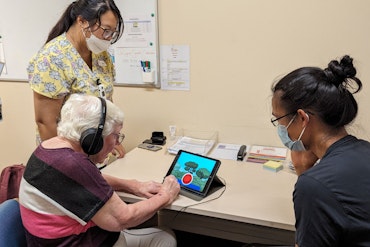National Diabetes Week 2023: the Great Debates
![<p>Academics and diabetes experts will sink their teeth into sweet scholarly discussions on diabetes [Image courtesy of Diabetes Australia]</p>](https://agedcareguide-assets.imgix.net/news/articles/wp/diabetesargued.jpg?fm=pjpg&format=auto&w=550&q=65)
Academics and diabetes experts will sink their teeth into sweet scholarly discussions on diabetes [Image courtesy of Diabetes Australia]
Key points:
- National Diabetes Week spans July 9 – 15, 2023
- Co-hosted by Diabetes Australia’s Group Chief Executive Officer [CEO] Justine Cain and Dr Norman Swan, Member of the Order of Australia [AM], the Great Debate series allows people to have their say on life with diabetes, in-person or online
- Live events will be hosted from Melbourne Town Hall, Victoria — July 11; Warrane Theatre, Museum of Sydney, NSW — July 12; and SAHMRI Auditorium, Adelaide, SA — July 13
The likelihood of developing adult-onset type-two diabetes increases with age, with one-in-five Australians over the age of 75 living with the condition. In general, older Australians are four times more likely to develop diabetes than the average Australian.
This National Diabetes Week, several ‘Great Debates’ will take place, encouraging those living with the condition and experts to have their say and offer insight into Australia’s approach to diabetes treatment and management.
The dates, times and topics are as follows:
Monday July 10, 7pm Australian Eastern Standard Time [AEST] — virtual event
Timely and affordable access: who cares?
Tuesday July 11, 6pm [AEST] — Melbourne Town Hall; livestream
Brain drain: is diabetes research in Australia in crisis?
Wednesday July 12, 6:15pm [AEST] — Warrane Theatre, Museum of Sydney; livestream
Australia’s obesity crisis: is there a magic pill?
Thursday July 13, 7pm [AEST] — SAHMRI Auditorium, Adelaide; livestream
Type-two diabetes remission: hype, hope or happening?
Friday July 14, 12:30pm [AEST] — virtual event
Keeping pace with treatments and tech: is Australia falling behind?
Comorbid or contributing factors to the development of type-two diabetes, such as obesity, will be addressed by leading specialists and the topics are shaping up to be contentious conversation starters.
According to the Australian Bureau of Statistics, type-two diabetes made up 85.5 percent of diagnoses in Australia, although it is generally regarded as preventable. Complications associated with people who have diabetes are also prevalent in ageing populations, such as Alzheimer’s disease and vascular dementia.
Professor Mark Cooper AM, Head of the Department of Diabetes at Monash University said the Government Inquiry into Diabetes in Australia aims to amplify the importance and widespread risk of the condition.
“Diabetes remains one of the major epidemics of the 21st century with a major associated burden as a result of complications — including effects on the heart, blood vessels, kidney and eyes,” said Professor Cooper.
“National Diabetes Week gives us the opportunity to be reminded about diabetes and how it remains a major health challenge in this century worldwide, including in Australia.”
“There have been major advances over the past decade in managing diabetes, with proven benefit in reducing these complications. However, as diabetes prevalence increases, more needs to be done at the public health level and in discovering new therapies to further improve the outlook of this very common condition.”
In particular, the discussion surrounding possible remission for Australians with type-two diabetes will inspire hope and instil a deep sense of pragmatism in audiences. If you’re interested in joining or sitting on the sidelines to see the Great Debates, apply online through Diabetes Australia.























